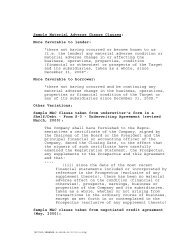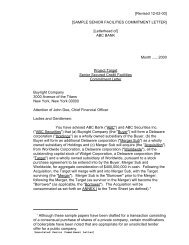LTV Aerospace & Defense Co. V. Thomson CSF - uccstuff
LTV Aerospace & Defense Co. V. Thomson CSF - uccstuff
LTV Aerospace & Defense Co. V. Thomson CSF - uccstuff
Create successful ePaper yourself
Turn your PDF publications into a flip-book with our unique Google optimized e-Paper software.
In re CHATEAUGAY CORPORATION, REOMAR, INC., THE <strong>LTV</strong><br />
CORPORATION, et al., Debtors. <strong>LTV</strong> AEROSPACE AND DEFENSE<br />
COMPANY, VOUGHT INDUSTRIES, INC., and VOUGHT INTERNATIONAL,<br />
INC., Appellees, -against- THOMSON-<strong>CSF</strong>, S.A. and VT MISSILE<br />
COMPANY, Appellants and <strong>Co</strong>unterclaim Appellants, -against-<br />
THE <strong>LTV</strong> CORPORATION, <strong>LTV</strong> AEROSPACE AND DEFENSE COMPANY,<br />
VOUGHT INDUSTRIES, INC., and VOUGHT INTERNATIONAL, INC.,<br />
<strong>Co</strong>unterclaim Appellees.<br />
95 Civ. 9502 (JFK)<br />
UNITED STATES DISTRICT COURT FOR THE SOUTHERN DISTRICT OF<br />
NEW YORK<br />
198 B.R. 848; 1996 U.S. Dist. LEXIS 10798<br />
July 30, 1996, FILED<br />
PRIOR HISTORY: [**1] Bankruptcy Case Nos. 86 B<br />
11270 (BRL) through 86 B 11334 (BRL) Inclusive, 86 B<br />
11402 (BRL) and 86 B 11464 (BRL) Jointly<br />
Administered Adv. No. 92-9531A.<br />
DISPOSITION: Orders of the Bankruptcy <strong>Co</strong>urt in<br />
Chateaugay I and Chateaugay II affirmed. Appeal<br />
dis missed in its entirety.<br />
COUNSEL: APPEARANCES:<br />
For Appellants and <strong>Co</strong>unterclaim Appellants:<br />
SHEARMAN & STERLING, New York, New York, Of<br />
<strong>Co</strong>unsel: George J. Wade, Esq., Alan S. Goudiss, Esq.,<br />
Andrew W. Feinberg, Esq., Kathryn Tabner, Esq.,<br />
Benjamin L. <strong>Co</strong>leman, Esq.<br />
For Appellees and <strong>Co</strong>unterclaim Appellees: KAYE,<br />
SCHOLER, FIERMAN, HAYS & HANDLER, LLP,<br />
New York, New York, Of <strong>Co</strong>unsel: Myron Kirschbaum,<br />
Esq., Scott M. Berman, Esq., Robert Grass, Esq.,<br />
Deborah Lewis, Esq.<br />
JUDGES: JOHN F. KEENAN, United States District<br />
Judge<br />
OPINIONBY: JOHN F. KEENAN<br />
OPINION: [*849] OPINION and ORDER<br />
JOHN F. KEENAN, United States District Judge:<br />
Before the <strong>Co</strong>urt is an appeal taken by <strong>Thomson</strong>-<strong>CSF</strong>,<br />
S.A. and VT Missile <strong>Co</strong>mpany (collectively,<br />
"<strong>Thomson</strong>") from two orders of the Honorable Burton R.<br />
Lifland, former Chief Judge of the United States<br />
Bankruptcy <strong>Co</strong>urt for the Southern District of New York<br />
in an adversary proceeding captioned In re Chateaugay<br />
<strong>Co</strong>rporation, 86 B 11270 [**2] (BRL), 86 B 11334<br />
(BRL), 86 B 11402 (BRL), 86 B 11464 (BRL) and Adv.<br />
No. 92-9531A. First, <strong>Thomson</strong> appeals that portion of an<br />
order dated June 21, 1993, <strong>LTV</strong> <strong>Aerospace</strong> & <strong>Defense</strong><br />
<strong>Co</strong>. v. <strong>Thomson</strong> <strong>CSF</strong>, S.A. (In re Chateaugay <strong>Co</strong>rp.), 155<br />
Bankr. 636 (Bankr. S.D.N.Y. 1993) ("Chateaugay I")<br />
which granted <strong>LTV</strong>'s motion, inter alia, to dismiss<br />
<strong>Thomson</strong>'s fifth counterclaim against The <strong>LTV</strong><br />
<strong>Co</strong>rporation, <strong>LTV</strong> <strong>Aerospace</strong> and <strong>Defense</strong> <strong>Co</strong>mpany<br />
("<strong>LTV</strong>AD"), Vought Industries, Inc., and Vought<br />
International, Inc. (collectively, "<strong>LTV</strong>"). Second,<br />
<strong>Thomson</strong> appeals four aspects of the Bankruptcy <strong>Co</strong>urt's<br />
Findings of Facts and <strong>Co</strong>nclusions of Law, dated August<br />
23, 1995, issued following a seven day trial. <strong>LTV</strong><br />
<strong>Aerospace</strong> & <strong>Defense</strong> <strong>Co</strong>. v. <strong>Thomson</strong> <strong>CSF</strong>, S.A. (In re<br />
Chateaugay <strong>Co</strong>rp.), 186 Bankr. 561 (Bankr. S.D.N.Y.<br />
1995) ("Chateaugay II"). <strong>LTV</strong> opposes <strong>Thomson</strong>'s<br />
appeal in all respects. The <strong>Co</strong>urt heard oral argument on<br />
this matter on July 2, 1996. For the reasons set forth<br />
below, the decisions of the Bankruptcy <strong>Co</strong>urt are<br />
affirmed.<br />
BACKGROUND<br />
I. The Adversary Proceeding<br />
This appeal from an adversary proceeding in the<br />
Bankruptcy <strong>Co</strong>urt arises out of an asset purchase<br />
agreement between <strong>LTV</strong> and <strong>Thomson</strong>, [**3] dated<br />
April 21, 1992 (the "Agreement"). Under the Agreement,<br />
<strong>Thomson</strong> was to purchase the assets of <strong>LTV</strong>AD's<br />
Missiles Division, a manufacturer of military and<br />
commercial aerospace and defense products. <strong>LTV</strong><br />
commenced the adversary proceeding in August 1992<br />
after <strong>Thomson</strong> announced that it regarded the Agreement<br />
as terminated. <strong>LTV</strong> sought to recover from <strong>Thomson</strong> a
$20 million "reverse break-up fee" due under the<br />
Agreement in the event <strong>Thomson</strong> failed to [*850]<br />
close on the purchase of the Missiles Division.<br />
In October 1992, <strong>LTV</strong> moved for summary judgment<br />
on its claims and dismissal of <strong>Thomson</strong>'s counterclaims.<br />
The Bankruptcy <strong>Co</strong>urt granted in part and denied in part<br />
the summary judgment motion, and granted the motion<br />
to dismiss certain of <strong>Thomson</strong>'s counterclaims. One of<br />
the dismissed counterclaims was <strong>Thomson</strong>'s fifth<br />
counterclaim asserting that the Agreement was<br />
terminated by virtue of the House of Representatives'<br />
passage of the Frost Amendment. See Chateaugay I, 155<br />
Bankr. at 653-56, 658.<br />
The Bankruptcy <strong>Co</strong>urt subsequently held a seven day<br />
trial of the remaining claims in late January and early<br />
February 1995. During the trial, the parties presented the<br />
testimony of more than twenty witnesses [**4] and<br />
introduced more than 200 exhibits. On August 23, 1995,<br />
the Bankruptcy <strong>Co</strong>urt issued an opinion finding that <strong>LTV</strong><br />
had satisfied its obligations under the Agreement and<br />
was therefore entitled, under the terms of the Agreement,<br />
to the $20 million reverse break-up fee promised by<br />
<strong>Thomson</strong>. Chateaugay II, 186 Bankr. at 595-97.<br />
II. The Proposed Sale of the Missiles Division to<br />
<strong>Thomson</strong><br />
<strong>LTV</strong>, the former parent company of <strong>LTV</strong>AD, has been<br />
in bankruptcy proceedings since July 1986, when it and<br />
sixty-four related companies filed a voluntary petition in<br />
the Bankruptcy <strong>Co</strong>urt seeking reorganization under<br />
chapter 11 of the Bankruptcy <strong>Co</strong>de. Driven by a need to<br />
raise the capital required to emerge from its historically<br />
lengthy and complex chapter 11 proceeding, <strong>LTV</strong><br />
publicly announced in May 1991 that it intended to sell<br />
the assets of <strong>LTV</strong>AD's Aircraft and Missiles Divisions.<br />
<strong>LTV</strong>AD was a manufacturer of military and commercial<br />
aerospace and defense products whose primary customer<br />
was the United States government. In fact, 98% of the<br />
Missiles Division's revenues derived from contracts with<br />
the United States military. Chateaugay II, 186 Bankr. at<br />
564.<br />
One of the entities expressing interest [**5] in the<br />
purchase of the Missiles Division was <strong>Thomson</strong>.<br />
<strong>Thomson</strong>-<strong>CSF</strong> is a manufacturer of military defense<br />
systems and components. Fifty-eight percent of the<br />
outstanding shares and seventy-five percent of the<br />
voting shares of <strong>Thomson</strong>-<strong>CSF</strong> are owned by <strong>Thomson</strong>,<br />
S.A., a corporation wholly owned by the government of<br />
France.<br />
Representatives of <strong>Thomson</strong> met with <strong>LTV</strong>AD's<br />
management in August 1991 to discuss the potential<br />
acquisition. <strong>Co</strong>ncerned with the effect its foreign<br />
ownership might have on its ability to own and operate<br />
the Missiles Division, <strong>Thomson</strong> inquired about the<br />
percentage of the Missiles Division's revenue derived<br />
from work on contracts with the United States<br />
government involving classified information. <strong>LTV</strong><br />
represented to <strong>Thomson</strong> during the meetings that the<br />
level of activity at the Missiles Division requiring access<br />
to highly classified information, referred to by <strong>LTV</strong> as<br />
"special access" or "black" programs, was in the range of<br />
approximately 5-7% of revenues. United States<br />
Department of <strong>Defense</strong> ("DOD") regulations prevented<br />
<strong>LTV</strong> from providing further information to <strong>Thomson</strong> and<br />
other prospective purchasers relating to these programs,<br />
including information necessary to enable prospective<br />
[**6] purchasers to evaluate the financial risks and<br />
rewards of such programs. See Chateaugay II, 186<br />
Bankr. at 588-89.<br />
In February 1992, <strong>LTV</strong> entered into an agreement to<br />
sell the assets of <strong>LTV</strong>AD's Missiles and Aircraft<br />
Divisions to the Vought <strong>Co</strong>rporation ("Vought"), a joint<br />
venture formed by subsidiaries of Martin Marietta<br />
<strong>Co</strong>rporation ("Martin") and Lockheed <strong>Co</strong>rporation<br />
("Lockheed"). Vought's $355 million bid for <strong>LTV</strong>AD's<br />
assets was subject to higher and better offers.<br />
The Bankruptcy <strong>Co</strong>urt held hearings in April 1992 to<br />
consider <strong>LTV</strong>'s application to the court for approval of<br />
the Vought agreement. The Bankruptcy <strong>Co</strong>urt set the<br />
return date of the application, April 1, 1992, as the<br />
deadline for submission of competing bids for purchase<br />
of the Missiles and Aircraft Divisions.<br />
On the return date, <strong>Thomson</strong> and The Carlyle Group<br />
("Carlyle"), a merchant banking firm based in<br />
Washington, D.C., submitted [*851] coordinated<br />
offers for <strong>LTV</strong>AD's Missiles and Aircraft Divisions. On<br />
the same day, Army and DOD representatives exp ressed<br />
their concern about <strong>Thomson</strong>'s bid to James Bell, the<br />
president of <strong>Thomson</strong>'s Delaware-based U.S. subsidiary,<br />
VT Missile <strong>Co</strong>mpany ("VT"), the entity that had been<br />
formed for the [**7] purpose of acquiring the Missiles<br />
Division. The government representatives expressed to<br />
Bell their belief that <strong>Thomson</strong>'s foreign ownership might<br />
pose a problem because as much as 70% of the Missiles<br />
Division's revenues came from contracts requiring access<br />
to classified information known as "<strong>Co</strong>mmunications<br />
Security Information" ("COMSEC") and other categories<br />
of classified information. n1 At the hearing on that date,<br />
the Bankruptcy <strong>Co</strong>urt adjourned the matter for one week<br />
so that the <strong>Thomson</strong>/Carlyle bids could be considered<br />
fully.<br />
n1 The Bankruptcy <strong>Co</strong>urt described the various<br />
categories of classified information as follows:
[**8]<br />
There are three general categories of classified<br />
information: "<strong>Co</strong>nfidential," "Secret" or "Top<br />
Secret." Within each general category, certain<br />
categories of information[,] access to which may be<br />
necessary in order to perform a contract[,] are also<br />
classified. The information categories include: "Top<br />
Secret," [COMSEC], "Restricted Data," "Special<br />
Access Program Information: and "Sensitive<br />
<strong>Co</strong>mpartmented Information."<br />
Chateaugay II, 186 Bankr. at 569 n.3.<br />
Under regulations promulgated by the DOD, every<br />
company performing work on government contracts<br />
must receive a Facility Security clearance. To obtain<br />
such clearance, foreign-owned companies such as<br />
<strong>Thomson</strong> are required to take steps to insulate foreign<br />
ownership, control or influence ("FOCI"). One way to<br />
minimize the effect of FOCI is through a Special<br />
Security Agreement ("SSA") with the United States<br />
government. A SSA permits a foreign owner to operate a<br />
U.S.-based subsidiary, provided the foreign owner<br />
implements controls to permit only approved U.S.<br />
citizens to have exposure to information implicating<br />
national security. Because a SSA is the highest form of<br />
security clearance available to a company with FOCI, it<br />
is the most difficult to obtain. Other more restrictive<br />
alternatives to a SSA include proxy agreements and<br />
voting trusts. n2<br />
[**9]<br />
n2 A proxy agreement allows the foreign owner to<br />
retain legal title to the stock but requires that all<br />
voting rights be irrevocably conveyed to U.S.<br />
citizens. See Industrial Security Regulations § 2-<br />
205(c). A voting trust requires a foreign owner to<br />
transfer legal title to its stock as well as management<br />
control to U.S. citizen trustees. See id. § 2-205(b).<br />
Despite the prospective difficulty in obtaining a SSA,<br />
<strong>Thomson</strong> was determined from the outset to secure such<br />
an agreement and had drafted a proposed SSA that would<br />
permit it to retain management control over the Missiles<br />
Division. <strong>Thomson</strong> claims that its proposed SSA was<br />
specially tailored to <strong>LTV</strong>'s representations to it in August<br />
1991 that the level of the Missiles Division's contracts<br />
involving access to highly classified information was in<br />
the range of approximately 5-7% of the Missiles<br />
Divis ion's revenues.<br />
Government officials were not receptive to <strong>Thomson</strong>'s<br />
proposed SSA. On April 6, 1992, <strong>Thomson</strong>'s counsel<br />
received a letter from Assistant Secretary of <strong>Defense</strong><br />
Duane Andrews stating that the DOD would not<br />
authorize a SSA that would permit <strong>Thomson</strong> to perform<br />
contracts requiring access to COMSEC. Andrews<br />
suggested that <strong>Thomson</strong> instead attempt to address FOCI<br />
concerns by entering into a proxy or voting trust<br />
agreement. This letter was followed on April 8, 1992<br />
with a letter from Acting DOD General <strong>Co</strong>unsel Chester<br />
Paul Beach, Jr. confirming Andrews' assessment of<br />
<strong>Thomson</strong>'s dim prospects for obtaining a SSA.<br />
At the hearings before the Bankruptcy <strong>Co</strong>urt on April<br />
8-10, 1992, Government [**10] representatives testified<br />
that the April 6 Andrews letter and the April 8 Beach<br />
letter accurately represented the DOD's position with<br />
respect to <strong>Thomson</strong>'s acquisition of the Missiles<br />
Division. An officer of <strong>LTV</strong>, James Powers, also<br />
testified at the hearing that the revenues of <strong>LTV</strong>AD's<br />
Missiles Division's from contracts requiring access to<br />
COMSEC information were as high as 75-80%, a figure<br />
that he believed would pose an insurmountable obstacle<br />
to <strong>Thomson</strong>'s ability to work out a viable SSA. Indeed,<br />
throughout the hearings, <strong>LTV</strong> favored Vought's lower<br />
$385 million bid to <strong>Thomson</strong>/Carlyle's $450 million<br />
offer due in great measure to the potential [*852]<br />
difficulties <strong>Thomson</strong> faced in obtaining the approval of<br />
the DOD and the President of the United States<br />
necessary to perform <strong>LTV</strong>AD's defense contracts for the<br />
United States. n3<br />
[**11]<br />
n3 Approval of the President is required under the<br />
Exon-Florio Amendment to the <strong>Defense</strong> Production<br />
Act of 1950, Pub. L. No. 100-418, 102 Stat. 1107,<br />
1425-26 (1988). The Exon-Florio Amendment<br />
authorizes the President "to suspend or prohibit any .<br />
. . acquisition . . . by or with a foreign person, of a<br />
person engaged in interstate commerce in the United<br />
States when, in the President's view, the foreign<br />
interest exercising control over that person might<br />
take action that threatens to impair the national<br />
security." 31 C.F.R. § 800.101.<br />
Undeterred in its intent to purchase <strong>LTV</strong>AD's Missiles<br />
Division, <strong>Thomson</strong> endeavored through the remainder of<br />
the hearings to convince the Bankruptcy <strong>Co</strong>urt and<br />
<strong>LTV</strong>'s creditors that it could successfully negotiate a<br />
SSA with the DOD. For instance, on April 9, 1992,<br />
<strong>Thomson</strong>'s counsel stated in open court that "<strong>Thomson</strong> is<br />
experienced not just in France, but has . . . . significant<br />
[contracts] in this country. It knows what it is about with<br />
respect to dealing with the U.S. government and with the<br />
Department of <strong>Defense</strong>." Chateaugay I, 155 Bankr. at<br />
643 (citing April 9, 1992 Transcript at 381). n4 Even<br />
more significantly, <strong>Thomson</strong> made an offer on the record
during the hearings to pay <strong>LTV</strong> a $20 million "reverse<br />
break-up fee" in the event that it failed to close the<br />
transaction due to an inability to obtain the requisite<br />
security approvals from the U.S. government.<br />
[**12]<br />
n4 Indeed, as the Bankruptcy <strong>Co</strong>urt later pointed<br />
out, <strong>Thomson</strong> did have experience dealing with the<br />
U.S. government, but that experience should have<br />
served only to underscore to <strong>Thomson</strong> the difficulties<br />
it would face obtaining security clearance from the<br />
U.S. government:<br />
In 1988, <strong>Thomson</strong>-<strong>CSF</strong> attempted to acquire the<br />
assets of the Ocean <strong>Defense</strong> <strong>Co</strong>rporation, known as<br />
Bendix-Oceanics, but was informed by the United<br />
States Navy that due to the extremely sensitive nature<br />
of Bendix-Oceanics work for the Navy, the<br />
applicable security regulations and restrictions would<br />
not permit the acquisition contemplated by <strong>Thomson</strong>-<br />
<strong>CSF</strong> and thus, the acquisition was terminated.<br />
Chateaugay II, 186 Bankr. at 565.<br />
On April 10, 1992, the Bankruptcy <strong>Co</strong>urt approved the<br />
<strong>Thomson</strong>/Carlyle offer. In approving the joint bid, the<br />
Bankruptcy <strong>Co</strong>urt noted that its decision had been<br />
influenced significantly by the financial disparity<br />
between Vought's and <strong>Thomson</strong>/Carlyle's offers and by<br />
<strong>Thomson</strong>'s offer to pay the reverse break-up fee. See<br />
Chateaugay I, 155 Bankr. at 643. <strong>Thomson</strong>'s obligation<br />
to pay the reverse break-up fee was subsequently<br />
incorporated in section 6.06 of the Agreement signed on<br />
April 21, 1992.<br />
<strong>Thomson</strong> spent the next months fighting an uphill<br />
battle with the U.S. government to obtain a SSA. n5 On<br />
May 7, 1992, <strong>Thomson</strong> was scheduled to make a<br />
presentation to the DOD committee responsible for<br />
reviewing national security issues associated with the<br />
transfer of the Missiles Division. <strong>Thomson</strong> requested that<br />
Missile Division representatives attend the meeting to<br />
support Thoms on's presentation. Richard Boyle,<br />
<strong>LTV</strong>AD's President and Chief Executive Officer,<br />
initially expressed his reluctance to require Missiles<br />
Division personnel to attend the meeting in a letter he<br />
wrote to Bell of VT. Boyle explained in the letter that he<br />
feared antagonizing the Army, the Missiles Division's<br />
primary customer, since [**13] the Army seemed to<br />
oppose <strong>Thomson</strong>'s proposed SSA. Boyle expressed this<br />
reluctance as his desire to avoid becoming "crossthreaded<br />
on a policy matter with a major customer."<br />
n5 <strong>Thomson</strong> also had a battle to fight with<br />
<strong>Co</strong>ngress. When <strong>Thomson</strong>'s interest in acquiring the<br />
[**14]<br />
Missiles Division was revealed publicly in early<br />
1992, numerous members of <strong>Co</strong>ngress, including<br />
Sam Nunn and Les Aspin, the respective chairmen of<br />
the Senate and House Armed Services <strong>Co</strong>mmittees,<br />
vociferously objected to the proposed acquisition.<br />
Opposition to <strong>Thomson</strong> was based primarily on three<br />
concerns: (1) that national security might be<br />
compromised through the transfer of sensitive<br />
technology to France and then to hostile third world<br />
nations; (2) the potential loss of American defense<br />
industry jobs and the potential inability of American<br />
firms to compete with <strong>Thomson</strong> given its suspected<br />
subsidization by the French government; and (3) the<br />
vulnerability of American defense companies to<br />
takeover by foreign corporations. Other opposition to<br />
the <strong>Thomson</strong> acquisition derived from the disclosure<br />
by the former director of the French Secret Service in<br />
the fall of 1991 that the agency had conducted<br />
extensive industrial espionage against American<br />
companies. See Chateaugay II, 186 Bankr. at 589 &<br />
n.8.<br />
[*853] After <strong>Thomson</strong> protested this position to<br />
David Hoag, <strong>LTV</strong>'s Chief Executive Officer, Hoag<br />
immediately instructed Boyle to provide <strong>LTV</strong><br />
representation at the meeting. <strong>Co</strong>nsequently, <strong>LTV</strong><br />
representatives attended the May 7 meeting. The<br />
Bankruptcy <strong>Co</strong>urt noted that <strong>LTV</strong> personnel also assisted<br />
<strong>Thomson</strong>'s representatives in preparing for the meeting,<br />
provided <strong>Thomson</strong> with the information it needed for the<br />
presentation, and participated in the meeting in a manner<br />
supportive of <strong>Thomson</strong>'s position. See Chateaugay II,<br />
186 Bankr. at 571-73.<br />
Although <strong>Thomson</strong> pressed its SSA proposal at the<br />
May 7 meeting, it was clear to the <strong>Thomson</strong> and <strong>LTV</strong><br />
participants that the DOD response to <strong>Thomson</strong>'s<br />
presentation was negative. The DOD held firmly to the<br />
position that the DOD would not approve a SSA for<br />
<strong>Thomson</strong>. They insisted that <strong>Thomson</strong> could proceed<br />
only with a proxy agreement or voting trust.<br />
In addition to obtaining some form of security<br />
agreement with the DOD, <strong>Thomson</strong> also needed to<br />
obtain the President's approval of the transaction under<br />
the Exon-Florio Amendment. Pursuant to Executive<br />
Order, the power to implement the Exon-Florio<br />
legislation is delegated to the <strong>Co</strong>mmittee on Foreign<br />
Investment in the [**15] United States ("CFIUS"), an<br />
intergovernmental agency.<br />
On May 19, 1992, the CFIUS began its 45-day<br />
investigation of <strong>Thomson</strong>'s proposed acquisition of the<br />
Missiles Division. The CFIUS submitted questionnaires
to be answered by <strong>Thomson</strong> and <strong>LTV</strong> concerning the<br />
security implications of the acquisition. <strong>LTV</strong> personnel<br />
devoted thousands of hours preparing answers to the<br />
CFIUS's questions. One of the questions posed to <strong>LTV</strong><br />
was: "To what extent does the design/production of<br />
<strong>LTV</strong>'s missiles require knowledge or COMSEC<br />
technology, equipment, and technical data" Responding<br />
to this question in a manner supportive of <strong>Thomson</strong>'s<br />
acquisition, <strong>LTV</strong>'s May 8, 1992 submission to the<br />
CFIUS provided as follows:<br />
The design/production of missiles does not require<br />
knowledge of COMSEC technology, equipment, and<br />
technical data. During development of the missile<br />
system, the basic use of COMSEC equipment is to<br />
provide a secure link to transmit classified flight test data<br />
from a missile in flight to a ground receiving station. The<br />
COMSEC equipment is used in the missile to encode or<br />
encrypt the data and the COMSEC equipment in the<br />
ground station is used to decode the data. The missile<br />
designers do not require [**16] any knowledge of<br />
COMSEC equipment except encoder installation<br />
requirements (size, weight, mounting requirements) and<br />
input electrical/electronic requirements (power<br />
requirements, instrumentation data stream<br />
characteristics/limitations, etc.). This type of information<br />
does not include COMSEC sensitive data and therefore<br />
does not require transfer of COMSEC technology<br />
information to the missile subsystem and system<br />
designers. Since production missiles do not require an<br />
instrumentation and telemetry system, COMSEC<br />
equipment normally is not required in support of<br />
production programs. The COMSEC equipment is<br />
provided by the U.S. Government as Government<br />
Furnished Equipment (GFE) to the Missiles Division for<br />
those programs which have COMSEC requirements.<br />
Most of the Missiles Division emp loyees assigned to a<br />
missile development program have no knowledge of<br />
COMSEC technology, equipment, or technical data,<br />
except such knowledge as is required to serve as<br />
custodians of the equipment. . . .<br />
Chateaugay II, 186 Bankr. at 575 (quoting May 8, 1992<br />
submission).<br />
On May 21, 1992, <strong>Thomson</strong> finally accepted defeat in<br />
its quest for a SSA and withdrew its SSA proposal from<br />
DOD consideration. Despite [**17] indications from<br />
the DOD that the only acceptable security arrangement<br />
for <strong>Thomson</strong> would be one that limited <strong>Thomson</strong>'s role<br />
to that of a passive investor, <strong>Thomson</strong> next began to<br />
work on a proxy proposal that would permit it to retain<br />
certain management control over operations of the<br />
Missiles Division. The DOD informed <strong>Thomson</strong> by letter<br />
dated June 16, 1992 that this proxy proposal was<br />
inconsistent with the DOD's view of a passive<br />
investment. Accordingly, the DOD rejected the proxy<br />
proposal and stated that "a Voting Trust is necessary to<br />
negate foreign ownership control and influence." [*854]<br />
However, <strong>Thomson</strong> would not agree to enter into such an<br />
arrangement.<br />
On July 6, 1992, <strong>Thomson</strong> withdrew its application for<br />
approval of the Agreement from the CFIUS. n6 Despite<br />
these signs of capitulation, <strong>Thomson</strong> insisted to the<br />
Bankruptcy <strong>Co</strong>urt that it had not abandoned its intent to<br />
go forward with the transaction. In late July, <strong>Thomson</strong><br />
informed <strong>LTV</strong> that it had reached an agreement with<br />
Loral <strong>Co</strong>rporation ("Loral") pursuant to which Loral<br />
would acquire a majority interest in the Missiles Division<br />
and <strong>Thomson</strong> would retain less than a ten percent<br />
ownership interest. However, on July 28, 1992, <strong>Thomson</strong><br />
informed [**18] <strong>LTV</strong> that it considered the Agreement<br />
terminated. The Bankruptcy <strong>Co</strong>urt subsequently<br />
approved a $475 million joint offer from Loral and<br />
Carlyle for the assets of the Missiles and Aircraft<br />
Divisions.<br />
n6 <strong>Thomson</strong>'s withdrawal from the CFIUS<br />
process occurred before the matter reached the<br />
President.<br />
DISCUSSION<br />
<strong>Thomson</strong> raises the following issues on appeal: (1)<br />
whether the Bankruptcy <strong>Co</strong>urt erred in finding that <strong>LTV</strong><br />
fulfilled its obligations under the Agreement, including<br />
that <strong>LTV</strong> used "all reasonable efforts" to assist <strong>Thomson</strong><br />
in acquiring <strong>LTV</strong>AD's Missiles Division; (2) whether the<br />
Bankruptcy <strong>Co</strong>urt erred in finding that communications<br />
between <strong>LTV</strong> and Martin or Lockheed after the<br />
Agreement was signed "were minimal and did not have<br />
the purpose or effect of subverting <strong>Thomson</strong>'s<br />
acquisition," Chateaugay II, 186 Bankr. at 591, and that<br />
<strong>LTV</strong> did not contact Martin to discuss a bid for the assets<br />
of <strong>LTV</strong>AD until after <strong>Thomson</strong> terminated the<br />
Agreement; (3) whether the Bankruptcy <strong>Co</strong>urt erred in<br />
granting <strong>LTV</strong>'s motion [**19] to dismiss <strong>Thomson</strong>'s<br />
fifth counterclaim and concluding that the Frost<br />
Amendment did not provide <strong>Thomson</strong> with an<br />
independent and legally sufficient reason to terminate the<br />
Agreement on July 28, 1992; and (4) whether the<br />
Bankruptcy <strong>Co</strong>urt erred in finding that payment to <strong>LTV</strong><br />
of the $20 million reverse break-up fee would not<br />
unjustly enrich <strong>LTV</strong>.<br />
I. <strong>LTV</strong>'s Fulfillment of Its <strong>Co</strong>ntractual Obligations to<br />
<strong>Thomson</strong><br />
The Bankruptcy <strong>Co</strong>urt found that <strong>LTV</strong> fulfilled its<br />
obligations under section 7.01 of the Agreement, which<br />
required <strong>LTV</strong> to make "all reasonable efforts" to
consummate the transaction with <strong>Thomson</strong>. <strong>Thomson</strong><br />
contends that the following conclusions of law and/or<br />
findings of fact of the Bankruptcy <strong>Co</strong>urt with respect to<br />
section 7.01 constitute reversible error: (1) that section<br />
7.01 of the Agreement "placed the burden of negotiating<br />
an SSA with the DOD on <strong>Thomson</strong>, not <strong>LTV</strong>,"<br />
Chateaugay II, 186 Bankr. at 595; (2) that section 7.01<br />
of the Agreement did not require <strong>LTV</strong> to lobby members<br />
of <strong>Co</strong>ngress to change their opinions with respect to<br />
<strong>Thomson</strong>'s acquisition; (3) that <strong>LTV</strong> satisfied its<br />
contractual obligations by performing the myriad tasks<br />
necessary to close the transaction and [**20] its<br />
assisting <strong>Thomson</strong> in dealing with the DOD, the CFIUS,<br />
and <strong>Co</strong>ngress; and (4) that <strong>Thomson</strong> withdrew from the<br />
transaction because it knew that it would not get CFIUS<br />
approval, not because of its problems with the DOD. The<br />
<strong>Co</strong>urt reviews the Bankruptcy <strong>Co</strong>urt's factual findings for<br />
clear error and its legal conclusions de novo. See<br />
Travellers Int'l, A.G. v. Trans World Airlines, Inc., 41<br />
F.3d 1570, 1574-75 (2d Cir. 1994).<br />
A. <strong>LTV</strong>'s Obligations Under Section 7.01<br />
1. "Reasonable Efforts" Clause<br />
The standard imposed by a "reasonable efforts" clause<br />
such as that contained in section 7.01 of the Agreement<br />
is indisputably less stringent than that imposed by the<br />
"best efforts" clauses contained elsewhere in the<br />
Agreement. Even in the face of a best efforts clause,<br />
however, a party is entitled to give "reasonable<br />
consideration to its own interests" in determining an<br />
appropriate course of action to reach the desired result.<br />
Bloor v. Falstaff Brewing <strong>Co</strong>rp., 601 F.2d 609, 614 (2d<br />
Cir. 1979); accord Triple-A Baseball Club Assocs. v.<br />
Northeastern Baseball, Inc., 832 F.2d 214, 226 (1st Cir.<br />
1987), [*855] cert. denied, 485 U.S. 935, 99 L. Ed. 2d<br />
272, 108 S. Ct. 1111 (1988). [**21] A party may thus<br />
exercise discretion, within its good faith business<br />
judgment, in devising a strategy for achieving its<br />
ultimate goal. Western Geophysical <strong>Co</strong>. of America, Inc.<br />
v. Bolt Assocs., Inc., 584 F.2d 1164, 1171 (2d Cir. 1978).<br />
Therefore, in order to prevail upon its allegations that<br />
<strong>LTV</strong> did not exert reasonable efforts to consummate the<br />
transaction, <strong>Thomson</strong> must demonstrate that <strong>LTV</strong>'s<br />
actions were inconsistent with good faith business<br />
judgments. See Travellers Int'l, A.G., 41 F.3d at 1575-<br />
76.<br />
2. The Parties' <strong>Co</strong>ntractual Obligations<br />
Section 7.01 of the Agreement requires both <strong>LTV</strong> and<br />
<strong>Thomson</strong> to "use all reasonable efforts to take, or cause<br />
to be taken, all actions and to do, or cause to be done, all<br />
things necessary or desirable under Applicable Law to<br />
consummate the transactions contemplated by this<br />
Agreement." The generalized obligations imposed upon<br />
<strong>LTV</strong> and <strong>Thomson</strong> by this section include<br />
executing and delivering such other documents,<br />
certificates, agreements and other writings and [taking]<br />
such other actions as may be reasonably necessary or<br />
desirable in order to consummate or implement<br />
expeditiously the transactions contemplated by this<br />
Agreement, [**22] including the Buyer's receipt of<br />
any amounts comprising or payable in respect of any<br />
Purchased Assets and the relevant Seller's receipt of any<br />
amounts comprising or payable in respect of any<br />
Excluded Assets.<br />
Two other sections of the Agreement are addressed<br />
specifically to <strong>Thomson</strong>'s obtaining a security<br />
arrangement with the DOD. One of these sections,<br />
section 4.09, represents that <strong>Thomson</strong> has reached an<br />
agreement in principle with the <strong>Defense</strong> Investigative<br />
Service ("DIS") concerning a SSA. n7 The other, section<br />
6.04, is a covenant by <strong>Thomson</strong> to enter into a SSA with<br />
the DOD. n8<br />
n7 Section 4.09 of the Agreement provides in<br />
relevant part:<br />
<strong>Thomson</strong> and [VT] believe that they have reached an<br />
agreement in principle with the [DIS] concerning the<br />
terms and conditions of [a final draft SSA] and have<br />
so advised the [DIS]. No representative of the [DIS]<br />
has expressed disagreement with this<br />
characterization.<br />
The DIS is an "agency of the DOD that interacts<br />
with industry participants with respect to compliance<br />
with the Industrial Security Regulations."<br />
Chateaugay II, 186 Bankr. at 570 n.5.<br />
[**23]<br />
n8 Section 6.04 provides: "As promptly as<br />
practicable after the date hereof, [VT] and <strong>Thomson</strong><br />
shall enter into a special security agreement with the<br />
[DOD] in substantially the form of the Special<br />
Security Agreement."<br />
B. Analysis<br />
1. <strong>LTV</strong>'s Assistance of <strong>Thomson</strong> with the DOD<br />
Upon de novo review, the <strong>Co</strong>urt affirms the<br />
Bankruptcy <strong>Co</strong>urt's legal conclusion that section 7.01 of<br />
the Agreement "placed the burden of negotiating a SSA<br />
with the DOD on <strong>Thomson</strong>, not <strong>LTV</strong>." Chateaugay II,<br />
186 Bankr. at 595. The Bankruptcy <strong>Co</strong>urt made this
determination by reading section 7.01 in conjunction<br />
with section 6.04.<br />
It is a fundamental principle of contract interpretation<br />
that "definitive, particularized contract language takes<br />
precedence over expressions of intent that are general,<br />
summary, or preliminary." John Hancock Mut. Life Ins.<br />
<strong>Co</strong>. v. Carolina Power & Light <strong>Co</strong>., 717 F.2d 664, 669<br />
n.8 (2d Cir. 1983); accord In re Intercarbon Bermuda,<br />
Ltd., 146 F.R.D. 64, 73 (S.D.N.Y. 1993). This <strong>Co</strong>urt<br />
finds, in accordance with this principle, that while<br />
section 7.01 imposed certain generalized obligations<br />
[**24] upon <strong>LTV</strong> to assist <strong>Thomson</strong> in closing the<br />
transaction, section 6.04 placed the specific burden of<br />
working out a security agreement with the DOD on<br />
<strong>Thomson</strong>. As the Bankruptcy <strong>Co</strong>urt pointed out, section<br />
7.01 was not relied upon by the parties where they<br />
sought to provide for the performance of specific tasks;<br />
such specific divisions of responsibility were spelled out<br />
in separate provisions of the Agreement. See Chateaugay<br />
II, 186 Bankr. at 591-92 (citing examples). Through<br />
section 6.04, the parties likewise placed the duty to work<br />
out a security arrangement with the DOD on <strong>Thomson</strong>.<br />
The <strong>Co</strong>urt further finds that even if the Agreement had<br />
required <strong>LTV</strong> to use reasonable efforts to assist <strong>Thomson</strong><br />
in obtaining a security arrangement with the DOD, <strong>LTV</strong><br />
fulfilled such a duty. The Bankruptcy <strong>Co</strong>urt [*856]<br />
made extensive factual findings that support a legal<br />
conclusion that <strong>LTV</strong> made reasonable efforts to assist<br />
<strong>Thomson</strong> in its negotiations with the DOD. See<br />
Chateaugay II, 186 Bankr. at 569-73, at PP 38-76.<br />
Among these findings were that: <strong>LTV</strong> met with<br />
<strong>Thomson</strong> for five days in April 1992 and provided<br />
<strong>Thomson</strong> with information crucial to dealing with the<br />
DOD, "including information to help <strong>Thomson</strong> deal<br />
[**25] with the issue of Proscribed Information<br />
necessary to perform Missiles Division contracts";<br />
<strong>Thomson</strong> advisors expressed their satisfaction with<br />
<strong>LTV</strong>'s cooperation and the information it had provided at<br />
the April 1992 meetings; <strong>LTV</strong> personnel assisted<br />
<strong>Thomson</strong> in its May 7 presentation to the DOD by<br />
providing information necessary for the meeting and<br />
attending and participating in the meeting in a manner<br />
helpful to <strong>Thomson</strong>; and <strong>LTV</strong> continued to assist<br />
<strong>Thomson</strong> with its efforts to obtain a proxy agreement<br />
with the DOD even after <strong>Thomson</strong> withdrew its<br />
application for a SSA. Id.<br />
<strong>LTV</strong> contests these factual findings in two main<br />
respects. First, <strong>Thomson</strong> claims that <strong>LTV</strong> failed to<br />
"educate the DOD with respect to the nature and extent<br />
of the COMSEC requirements associated with the design<br />
and production of <strong>LTV</strong>AD's missiles." <strong>Thomson</strong> Mem.<br />
of Law at 30. <strong>Thomson</strong> argues that it was incumbent<br />
upon <strong>LTV</strong> to correct "misimpressions" it had allegedly<br />
fostered "about COMSEC and the 5-7% estimate." Id. at<br />
31.<br />
The Bankruptcy <strong>Co</strong>urt rejected these contentions,<br />
relying upon extensive factual findings supporting that<br />
<strong>LTV</strong> had not created any misimpressions with respect to<br />
COMSEC or the 5-7% estimate. Indeed, [**26] the<br />
Bankruptcy <strong>Co</strong>urt found that the 5-7% figure concerning<br />
"special access" or "black" programs and the 75-80%<br />
figure concerning the percentage of the Missiles<br />
Division's revenues derived from work requiring access<br />
to proscribed information "were [both] accurate and<br />
consistent." Chateaugay II, 186 Bankr. at 588-89. After<br />
carefully reviewing the Bankruptcy <strong>Co</strong>urt's findings on<br />
this issue and the evidence upon which the findings are<br />
based, this <strong>Co</strong>urt concludes that those factual findings<br />
are not clearly erroneous. Therefore, the <strong>Co</strong>urt finds that<br />
<strong>LTV</strong> did not create any misimpression regarding either<br />
the 5-7% estimate or the 75-80% estimate.<br />
Nor does the <strong>Co</strong>urt agree with <strong>Thomson</strong>'s contention<br />
that <strong>LTV</strong> failed to educate the DOD with respect to<br />
COMSEC. In this regard, <strong>Thomson</strong> particularly<br />
complains that <strong>LTV</strong> failed to supply the DOD with<br />
helpful information on COMSEC that it submitted to the<br />
CFIUS on May 8, 1992. The essence of the information<br />
<strong>LTV</strong> provided to the CFIUS was that "the<br />
design/production of missiles does not require<br />
knowledge of COMSEC technology, equipment, and<br />
technical data." <strong>Thomson</strong>'s presentation to the DOD on<br />
May 7 made a similar and consistent point -- that "the<br />
development [**27] and testing functions in the<br />
Missiles Division contracts requiring access to COMSEC<br />
could be isolated and segregated from the production<br />
function under those contracts." Chateaugay II, 186<br />
Bankr. at 572. <strong>LTV</strong> supplied the information on which<br />
<strong>Thomson</strong>'s May 7 presentation was based. Moreover, the<br />
DOD had access to the information <strong>LTV</strong> supplied to the<br />
CFIUS. Id. at 574-75. Given these facts, the <strong>Co</strong>urt does<br />
not find that <strong>LTV</strong> failed to use reasonable efforts to<br />
supply the appropriate Government officials with<br />
information on COMSEC that was helpful to <strong>Thomson</strong>'s<br />
proposed acquisition of the Missiles Division.<br />
Second, <strong>Thomson</strong> contends that, contrary to the<br />
Bankruptcy <strong>Co</strong>urt's factual finding, <strong>LTV</strong> failed to<br />
support <strong>Thomson</strong> at the critical May 7 meeting with the<br />
DOD. However, the <strong>Co</strong>urt finds that there is substantial<br />
evidence to support the Bankruptcy <strong>Co</strong>urt's factual<br />
findings that despite Boyle's initial reluctance to assist<br />
<strong>Thomson</strong> with its May 7 presentation to the DOD, <strong>LTV</strong><br />
ultimately provided significant assistance to <strong>Thomson</strong><br />
for the May 7 meeting. For instance, even <strong>Thomson</strong><br />
admits -- albeit grudgingly -- that <strong>LTV</strong> personnel<br />
attended and participated in the May 7 meeting. See<br />
<strong>Thomson</strong> [**28] Mem. at 33. The evidence also
supports, and <strong>Thomson</strong> does not dispute, that <strong>LTV</strong><br />
provided the information <strong>Thomson</strong> used to make its<br />
presentation at the meeting. See Chateaugay II, 186<br />
Bankr. at 572-73. This assistance by <strong>LTV</strong> with the May<br />
7 presentation constitutes a "reasonable effort" by <strong>LTV</strong>.<br />
[*857] Although <strong>Thomson</strong> asserts that there was<br />
testimony presented to contradict the Bankruptcy <strong>Co</strong>urt's<br />
factual finding that a key <strong>LTV</strong> representative, Missiles<br />
Division Senior Vice President Jay Musselman,<br />
participated at the May 7 meeting, it acknowledges that<br />
there was also testimony to support the Bankruptcy<br />
<strong>Co</strong>urt's finding. Indeed, one of <strong>Thomson</strong>'s own<br />
documents, a memorandum prepared the day after the<br />
meeting, makes clear that Musselman participated<br />
actively at the meeting. See R.479 at T022696 ("Jay<br />
Musselman of <strong>LTV</strong>MD clarified specific points."),<br />
T022697 ("Mr. Musselman interjected that the<br />
production contract for MLRS is performed at Camden<br />
and that the development efforts are not integrated with<br />
the production contract."). n9 <strong>Thomson</strong> therefore fails<br />
utterly to convince this <strong>Co</strong>urt that the Bankruptcy <strong>Co</strong>urt's<br />
finding was erroneous. The Bankruptcy <strong>Co</strong>urt had the<br />
right and duty to decide what [**29] evidence to credit<br />
in making its factual findings.<br />
n9 "R." refers to the Record on Appeal in this<br />
action.<br />
Similarly, the Bankruptcy <strong>Co</strong>urt's finding that<br />
"Musselman was not asked by <strong>Thomson</strong> to make a<br />
presentation at the meeting," Chateaugay II, 186 Bankr.<br />
at 573, is not clearly erroneous. There was evidence in<br />
the record to support that finding. See R.59 at 90<br />
(Musselman's deposition testimony that he was not asked<br />
to make a presentation). Although there was also<br />
evidence in the record contradicting that finding, see,<br />
e.g., R.50 at 677-79 (Bell's deposition testimony that he<br />
spoke with Musselman about making a presentation at<br />
the May 7 meeting), the <strong>Co</strong>urt finds no clear error in the<br />
Bankruptcy <strong>Co</strong>urt's selection of the evidence it found to<br />
be most credible. See Banker v. Nighswander, Martin &<br />
Mitchell, 37 F.3d 866, 870 (2d Cir. 1994) ("Where there<br />
are two permissible views of the evidence, the<br />
factfinder's choice between them cannot be clearly<br />
erroneous.").<br />
2. <strong>LTV</strong>'s Efforts with the CFIUS [**30]<br />
<strong>Thomson</strong> also argues that <strong>LTV</strong> failed to provide it<br />
adequate assistance in obtaining the approval of the<br />
CFIUS necessary to secure the President's approval<br />
under the Exon-Florio Amendment. The Bankruptcy<br />
<strong>Co</strong>urt found with respect to the CFIUS that <strong>LTV</strong> in fact<br />
expended considerable efforts to respond to requests for<br />
information from the CFIUS, devoting 20 <strong>LTV</strong>AD<br />
employees to work long hours on the responses and<br />
sending <strong>LTV</strong> employees to lengthy CFIUS meetings at<br />
which they answered questions from members of the<br />
CFIUS. The Bankruptcy <strong>Co</strong>urt also found that <strong>LTV</strong>'s<br />
extensive responses to CFIUS's requests for information<br />
supported <strong>Thomson</strong>'s position. See Chateaugay II, 186<br />
Bankr. at 573-75.<br />
Ignoring the Bankruptcy <strong>Co</strong>urt's factual findings<br />
concerning the efforts of <strong>LTV</strong> personnel in the CFIUS<br />
process, <strong>Thomson</strong> claims that the Bankruptcy <strong>Co</strong>urt<br />
erroneously equated compliance with the CFIUS's<br />
requests for information with <strong>LTV</strong>'s obligation to use all<br />
"reasonable efforts." <strong>Thomson</strong> complains that the "only<br />
arguable assistance" <strong>LTV</strong> provided with respect to the<br />
CFIUS process was the submission of two pages of<br />
helpful information "buried" in two inches of other<br />
"relatively meaningless information." <strong>Thomson</strong> [**31]<br />
Mem. at 35-36.<br />
<strong>Thomson</strong>'s characterization of <strong>LTV</strong>'s efforts with<br />
regard to the CFIUS process is grossly inaccurate. The<br />
record in this action demonstrates, as the Bankruptcy<br />
<strong>Co</strong>urt found, that <strong>LTV</strong> did far more to assist <strong>Thomson</strong><br />
with the CFIUS than supply "two pages" of helpful<br />
information. Indeed, the only alleged shortcoming of<br />
<strong>LTV</strong> that <strong>Thomson</strong> can point to is <strong>LTV</strong>'s failure to<br />
display the helpful information it provided to the CFIUS<br />
more prominently. Accordingly, the <strong>Co</strong>urt finds that<br />
<strong>LTV</strong> made reasonable efforts to assist <strong>Thomson</strong> with the<br />
CFIUS process in accordance with section 7.01 of the<br />
Agreement.<br />
3. <strong>LTV</strong>'s Efforts with <strong>Co</strong>ngress<br />
<strong>Thomson</strong> next contends that the Bankruptcy <strong>Co</strong>urt<br />
erred in finding that section 7.01 of the Agreement "did<br />
not require <strong>LTV</strong> to lobby members of <strong>Co</strong>ngress to<br />
change their opinions with respect to <strong>Thomson</strong>'s<br />
acquisition." Chateaugay II, 186 Bankr. at 595. In so<br />
finding, the Bankruptcy <strong>Co</strong>urt detailed the substantial<br />
efforts of <strong>LTV</strong> on <strong>Thomson</strong>'s behalf in the congressional<br />
arena, which included numerous contacts with members<br />
of <strong>Co</strong>ngress. See id. at 577-78. The Bankruptcy [*858]<br />
<strong>Co</strong>urt also noted that although <strong>Thomson</strong> "complained<br />
about various things that it thought [**32] <strong>LTV</strong> could<br />
or should have done differently to assist <strong>Thomson</strong>[,]<br />
virtually all of these things would have been useless<br />
gestures that <strong>LTV</strong> reasonably determined would have<br />
been counterproductive or would have been deleterious<br />
to <strong>LTV</strong>'s business no matter who its owner was." Id. at<br />
578.<br />
The <strong>Co</strong>urt affirms the legal conclusion of the<br />
Bankruptcy <strong>Co</strong>urt that <strong>LTV</strong>'s duty under section 7.01 to<br />
use reasonable efforts to consummate the transaction
with <strong>Thomson</strong> did not stretch so far as to require it to<br />
make futile gestures or to engage in activity harmful to<br />
its own interests. See Bloor, 601 F.2d at 614. <strong>LTV</strong>'s<br />
strategy decision not to waste lobbying efforts on those<br />
members of <strong>Co</strong>ngress who had already expressed<br />
opposition to <strong>Thomson</strong>'s acquisition of the Missiles<br />
Division was a good faith business judgment. In any<br />
event, <strong>Thomson</strong> does not challenge the Bankruptcy<br />
<strong>Co</strong>urt's factual finding that, at <strong>Thomson</strong>'s request, <strong>LTV</strong><br />
did contact certain members of <strong>Co</strong>ngress who had gone<br />
on record as being opposed to <strong>Thomson</strong>'s bid. See<br />
Chateaugay II, 186 Bankr. at 578, P 111 ("At <strong>Thomson</strong>'s<br />
request, <strong>LTV</strong> contacted numerous members of the Texas<br />
delegation, including some members who had publicly<br />
proclaimed [**33] opposition to <strong>Thomson</strong>'s acquisition<br />
. . . ."); P 115 ("Although [Senator David] Boren and<br />
[<strong>Co</strong>ngressman Dave] McCurdy had expressed opposition<br />
to the transaction, . . . a member of <strong>LTV</strong>'s Board . . .<br />
contacted them and spoke to them in favor of the<br />
transaction."). Accordingly, the <strong>Co</strong>urt finds that <strong>LTV</strong>'s<br />
efforts to gain congressional support for <strong>Thomson</strong>'s<br />
acquisition of the Missiles Division were not in breach of<br />
its duties under section 7.01 of the Agreement.<br />
4. <strong>LTV</strong>'s Other Efforts<br />
<strong>Thomson</strong> also argues that the Bankruptcy <strong>Co</strong>urt<br />
erroneously focused on a number of "meaningless tasks"<br />
<strong>LTV</strong> performed in reaching its conclusion that <strong>LTV</strong><br />
complied with the Agreement. In addition to the efforts<br />
discussed above, these other tasks included developing<br />
and implementing a plan of action to assist <strong>Thomson</strong> in<br />
consummating the acquisition, issuing press releases<br />
demonstrating <strong>LTV</strong>'s support of <strong>Thomson</strong>, mobilizing<br />
<strong>LTV</strong>'s employees to assist with the plan, and<br />
communicating with <strong>Thomson</strong>. See Chateaugay II, 186<br />
Bankr. at 566-69.<br />
The <strong>Co</strong>urt disagrees with <strong>Thomson</strong>'s assertion that the<br />
Bankruptcy <strong>Co</strong>urt focused on insignificant acts of <strong>LTV</strong><br />
while turning a blind eye toward <strong>LTV</strong>'s failure to<br />
perform [**34] other vital duties. As discussed in the<br />
preceding sections, the Bankruptcy <strong>Co</strong>urt thoroughly<br />
analyzed <strong>LTV</strong>'s efforts in the areas identified by<br />
<strong>Thomson</strong> as crucial to the success of the transaction.<br />
That the Bankruptcy <strong>Co</strong>urt also noted other activities of<br />
<strong>LTV</strong> in reaching its decision does not undermine its legal<br />
determination that <strong>LTV</strong> complied with section 7.01 of<br />
the Agreement. In effect, <strong>Thomson</strong> improperly urges that<br />
the Bankruptcy <strong>Co</strong>urt should have speculated about what<br />
other steps <strong>LTV</strong> could have taken to assist <strong>Thomson</strong><br />
instead of examining the good faith efforts it did make.<br />
See Triple-A Baseball Club Assocs., 832 F.2d at 227-28<br />
("While a best efforts clause requires good faith activity<br />
in light of the party's own capabilities and expertise, once<br />
such activity is demonstrated, it is clearly erroneous for a<br />
court to speculate as to what other steps the party should<br />
have taken.").<br />
5. The Effect of the CFIUS Opposition on <strong>Thomson</strong><br />
<strong>Thomson</strong> also attacks the factual finding of the<br />
Bankruptcy <strong>Co</strong>urt that "<strong>Thomson</strong> withdrew from the<br />
transaction not because of its problems with the DOD,<br />
which might have been solved if it had agreed to a voting<br />
trust, but rather because it knew that [**35] it could not<br />
get CFIUS approval." Chateaugay II, 186 Bankr. at 591.<br />
As this finding is supported by substantial evidence, it is<br />
not clearly erroneous.<br />
As the Bankruptcy <strong>Co</strong>urt observed, <strong>Thomson</strong> faced<br />
substantial opposition in the CFIUS process. The storm<br />
of protest in <strong>Co</strong>ngress to <strong>Thomson</strong>'s acquisition of the<br />
Missiles Division created pressure on the Bush<br />
Administration to reject the proposal. Indeed, General<br />
Brent Scowcroft, National Security Adviser to President<br />
George Bush, advised representatives of <strong>Thomson</strong> in a<br />
meeting on June 9, 1992 that his office had never before<br />
received so much negative input from congressional<br />
sources on one subject. [*859] See Chateaugay II, 186<br />
Bankr. at 590; R.50 at 806-07 (Bell deposition<br />
testimony). Therefore, even if it was able to obtain a<br />
security agreement agreeable to the DOD, <strong>Thomson</strong><br />
most likely could not have obtained the approval from<br />
the President required by the Exon-Florio Amendment.<br />
Given these circumstances, the <strong>Co</strong>urt does not find that it<br />
was clearly erroneous for the Bankruptcy <strong>Co</strong>urt to infer<br />
that <strong>Thomson</strong>'s prospective inability to secure CFIUS's<br />
approval caused it to withdraw from the transaction.<br />
II. <strong>LTV</strong> Did Not <strong>Co</strong>mmunicate with [**36] Martin in<br />
a Manner Designed to Subvert <strong>Thomson</strong>'s Acquisition of<br />
the Missiles Division<br />
<strong>Thomson</strong> claims that the Bankruptcy <strong>Co</strong>urt erred in<br />
finding that (1) contacts between representative of <strong>LTV</strong><br />
and either Martin or Lockheed after it approved the<br />
Agreement "were minimal and did not have the purpose<br />
or effect of subverting <strong>Thomson</strong>'s acquisition,"<br />
Chateaugay II, 186 Bankr. at 591, and (2) that <strong>LTV</strong> did<br />
not contact Martin to discuss a bid for the assets of<br />
<strong>LTV</strong>AD "until after <strong>Thomson</strong> terminated the . . .<br />
Agreement on July 28, 1992." Id. The <strong>Co</strong>urt reviews<br />
these factual findings of the Bankruptcy <strong>Co</strong>urt for clear<br />
error. Under this standard, the <strong>Co</strong>urt may not upset the<br />
Bankruptcy <strong>Co</strong>urt's factual findings unless it is "'left with<br />
the definite and firm conviction that a mistake has been<br />
committed.'" Travellers Int'l, 41 F.3d at 1574 (quoting<br />
United States v. United States Gypsum <strong>Co</strong>., 333 U.S.<br />
364, 395, 92 L. Ed. 746, 68 S. Ct. 525 (1948)).
The <strong>Co</strong>urt finds that the Bankruptcy <strong>Co</strong>urt did not err<br />
in finding that contacts between <strong>LTV</strong> and Martin or<br />
Lockheed between April 10 and July 28, 1992 were<br />
minimal and did not harm <strong>Thomson</strong>'s acquisition efforts.<br />
There is abundant evidence in the [**37] record to<br />
support the Bankruptcy <strong>Co</strong>urt's finding. See R.39 at 87-<br />
88, 182, R.63 at 94-95, R.66 at 123, 168 (substantiating<br />
view that <strong>LTV</strong> supported <strong>Thomson</strong>'s bid and preferred<br />
<strong>Thomson</strong> to Martin and Lockheed); R.39 at 87-88, R.62<br />
at 288-89, 296-97, R.393 at 123 (supporting position that<br />
<strong>LTV</strong> did not believe that Martin and Lockheed would<br />
renew their bid if <strong>Thomson</strong> and Carlyle failed to close).<br />
The Bankruptcy <strong>Co</strong>urt also did not err in finding that<br />
<strong>LTV</strong> did not contact Martin to discuss a bid for<br />
<strong>LTV</strong>AD's assets until after <strong>Thomson</strong> terminated the<br />
Agreement on July 28, 1992. <strong>Thomson</strong> contends that this<br />
finding is belied by a letter, dated May 29, 1992, from<br />
Martin's counsel to <strong>LTV</strong>'s bankruptcy counsel in which<br />
the former stated that Vought had a "continuing interest"<br />
in acquiring <strong>LTV</strong>AD's assets and suggested that <strong>LTV</strong><br />
should conduct further discussions "in terms of a no<br />
bidding context." Although the Bankruptcy <strong>Co</strong>urt did not<br />
address the letter explicitly in its decision, the letter is<br />
consistent with the Bankruptcy <strong>Co</strong>urt's finding that <strong>LTV</strong><br />
did not contact Martin with the intent of subverting<br />
<strong>Thomson</strong>'s bid. First, the letter reflects that it was Martin,<br />
not <strong>LTV</strong>, that initiated contact. Second, [**38] there is<br />
no evidence that any <strong>LTV</strong> official actually saw this<br />
letter. n10 Finally, even if <strong>LTV</strong> officials had seen the<br />
letter, there is no evidence that it had the purpose or<br />
effect of subverting <strong>Thomson</strong>'s bid; to the contrary, the<br />
evidence shows that <strong>LTV</strong> assisted <strong>Thomson</strong> substantially<br />
in its acquisition efforts.<br />
n10 Although <strong>Thomson</strong> argues that it is unrealistic<br />
to assume that <strong>LTV</strong>'s counsel did not share the letter<br />
with <strong>LTV</strong> officials, it is unable to point to any<br />
evidence to support an inference that the letter was<br />
shown to <strong>LTV</strong> officials. <strong>LTV</strong>, on the other hand,<br />
cites evidence in the record indicating that such an<br />
inference would be unjustified. Mr. Hoag and James<br />
Powers, the former Chief Financial Officer of <strong>LTV</strong>,<br />
both testified that they had not been shown this letter<br />
and were not aware of its contents. R.39 at 140-41<br />
(Hoag trial testimony on January 30, 1995); R.62 at<br />
307-11 (Powers deposition transcript).<br />
III. The Bankruptcy <strong>Co</strong>urt Properly Dismissed<br />
<strong>Thomson</strong>'s Fifth <strong>Co</strong>unterclaim For Termination of the<br />
[**39] Agreement<br />
<strong>Thomson</strong> next contends that the dismissal of its fifth<br />
counterclaim, based on the Frost Amendment, was<br />
erroneous. In the fifth counterclaim, <strong>Thomson</strong> alleged<br />
that the Frost Amendment provided it with an<br />
independent and legally sufficient reason to terminate the<br />
Agreement on July 28, 1992. On [*860] this appeal,<br />
<strong>Thomson</strong> contends that the Frost Amendment permitted<br />
termination of the Agreement under the common law<br />
doctrines of frustration of purpose and impossibility and<br />
under section 13.01(iii) of the Agreement. n11 The <strong>Co</strong>urt<br />
reviews the Bankruptcy <strong>Co</strong>urt's dismissal of the claim de<br />
novo. In re Chateaugay <strong>Co</strong>rp., 104 Bankr. 637, 642<br />
(S.D.N.Y. 1989).<br />
n11 Section 13.01(iii) permits either party to<br />
terminate the Agreement "at any time prior to closing<br />
. . . should a federal law be enacted or become<br />
applicable that makes the Purchase and Sale<br />
contemplated [by the Agreement] or the<br />
consummation of the Closing illegal or otherwise<br />
prohibited."<br />
<strong>Thomson</strong> and Carlyle agreed to assume responsibility<br />
between them [**40] for all obligations under the<br />
Aircraft and Missile Divisions' employees' collective<br />
bargaining agreement. See Chateaugay I, 155 Bankr. at<br />
655; R.393 at 430 (transcript of <strong>Thomson</strong>'s counsel at<br />
April 10, 1992 hearing stating "Carlyle will assume the<br />
liabilities of the collective bargaining agreement with<br />
respect to the aircraft workers and <strong>Thomson</strong> will assume<br />
those liabilities with respect to the missile division<br />
workers."). <strong>Thomson</strong> contends that the Frost Amendment<br />
materially changed these obligations, giving rise to a<br />
right on its part to terminate the Agreement. The <strong>Co</strong>urt<br />
disagrees.<br />
<strong>Co</strong>ngressman Frost introduced the proposed Frost<br />
Amendment to the House of Representatives on May 27,<br />
1992. Although the amendment passed the House of<br />
Representatives before the scheduled closing date of the<br />
<strong>Thomson</strong> transaction, it was not enacted into law until<br />
October 23, 1992. The amendment was a measure to<br />
ensure that the entity which ultimately purchased<br />
<strong>LTV</strong>AD's assets assumed payment of benefits to<br />
<strong>LTV</strong>AD's unionized retirees under their collective<br />
bargaining agreement. Section (a)(2) of the Frost<br />
Amendment precludes a sale of "all or any part of<br />
[<strong>LTV</strong>AD's] assets to any other person or entity [**41]<br />
unless the person or entity agrees to assume, to the extent<br />
required under any collective bargaining agreement<br />
entered into by [<strong>LTV</strong>AD], all the liabilities of [<strong>LTV</strong>AD]<br />
to all of the employees of [<strong>LTV</strong>AD] who have retired."<br />
Section (c)(1) of the amendment further provides that "if<br />
a person or entity . . . purchases [<strong>LTV</strong>AD] during the<br />
period [between April 1, 1992 and 60 days after the date<br />
of enactment] . . . the purchaser [shall] assume all the<br />
liabilities of [<strong>LTV</strong>AD] to all of the employees of such
company who have retired (including all the liabilities<br />
described in subsection (a)(2))."<br />
<strong>Thomson</strong>'s entire argument with respect to the Frost<br />
Amendment rests on an untenable reading of that statute.<br />
It claims that sections (a)(2) and (c)(1), read together,<br />
make <strong>Thomson</strong> independently responsible for the retired<br />
employees of both the Missiles and Aircraft Divisions.<br />
However, the <strong>Co</strong>urt finds that because (a)(2) clearly<br />
provides that a purchaser -- here <strong>Thomson</strong> -- must<br />
assume obligations to <strong>LTV</strong>AD's employees only "to the<br />
extent required under any collective bargaining<br />
agreement," the Frost Amendment merely would have<br />
reimposed an obligation upon <strong>Thomson</strong> that <strong>Thomson</strong><br />
had [**42] already agreed to assume. Although<br />
<strong>Thomson</strong> argues that the generalized language of section<br />
(c)(1) that the purchaser must assume "all the liabilities<br />
of the [<strong>LTV</strong>AD] to all of the employees of such<br />
company" (emphasis added) broadens the specific<br />
obligation of section (a)(2), rules of statutory<br />
construction provide otherwise: "It is a commonplace of<br />
statutory construction that the specific governs the<br />
general." Morales v. Trans World Airlines, 504 U.S. 374,<br />
384-85, 119 L. Ed. 2d 157, 112 S. Ct. 2031 (1992)<br />
(emphasis added) (citing Crawford Fitting <strong>Co</strong>. v. J.T.<br />
Gibbons, Inc., 482 U.S. 437, 445, 96 L. Ed. 2d 385, 107<br />
S. Ct. 2494 (1987)); see also United States v. LaPorta,<br />
46 F.3d 152, 156 (2d Cir. 1994) ("Under long-standing<br />
principles of statutory construction, a general section of a<br />
statute must give way to a specific one."). Further<br />
substantiating the <strong>Co</strong>urt's interpretation, section (c)(1)<br />
expressly incorporates the obligations of section (a)(1).<br />
Because the <strong>Co</strong>urt therefore finds that the Frost<br />
Amendment did not change <strong>Thomson</strong>'s obligations in<br />
any respect, it holds that the Frost Amendment did not<br />
frustrate or make impossible <strong>Thomson</strong>'s closing of the<br />
transaction [**43] and did not provide <strong>Thomson</strong> with a<br />
right to [*861] terminate the Agreement under section<br />
13.01(iii).<br />
IV. <strong>Thomson</strong>'s Payment of the $20 Million Break-Up<br />
Fee Will Not Unjustly Enrich <strong>LTV</strong><br />
Finally, <strong>Thomson</strong> disputes the Bankruptcy <strong>Co</strong>urt's<br />
legal determination that <strong>LTV</strong> would not be unjustly<br />
enriched if it was awarded the $20 million reverse breakup<br />
fee. It contends that payment of the fee to <strong>LTV</strong> would<br />
constitute unjust enrichment because: (1) <strong>LTV</strong> received<br />
more from the eventual sale of the Missiles and Aircraft<br />
Divisions than it would have if <strong>Thomson</strong>'s bid<br />
succeeded; and (2) <strong>LTV</strong> acted inequitably by frustrating<br />
<strong>Thomson</strong>'s acquisition and favoring Vought's bid. The<br />
<strong>Co</strong>urt reviews de novo the legal conclusion of the<br />
Bankruptcy <strong>Co</strong>urt.<br />
Unjust enrichment is found where one party has been<br />
enriched at another party's expense and acceptance and<br />
retention of the benefit under the circumstances would be<br />
unjust. Dolmetta v. Uintah Nat'l <strong>Co</strong>rp., 712 F.2d 15, 20<br />
(2d Cir. 1983). A finding of unjust enrichment is a legal<br />
inference to be drawn from the surrounding<br />
circumstances and the parties' relationship. Sharp v.<br />
Kosmalski, 40 N.Y.2d 119, 123, 351 N.E.2d 721, 724,<br />
386 N.Y.S.2d 72, 76 [**44] (1976).<br />
The <strong>Co</strong>urt finds that <strong>LTV</strong> will not be unjustly enriched<br />
by the receipt of the reverse break-up fee since it would<br />
merely be receiving the benefit of its bargain with<br />
<strong>Thomson</strong>. <strong>Thomson</strong> agreed in open court and in writing<br />
to pay the $20 million fee under the very events that have<br />
transpired. <strong>Thomson</strong>'s promise to pay the fee played an<br />
integral role in the Bankruptcy <strong>Co</strong>urt's decision to<br />
approve <strong>Thomson</strong>'s bid. See Chateaugay II, 186 Bankr.<br />
at 597. The <strong>Co</strong>urt finds no activity on <strong>LTV</strong>'s part that<br />
would justify depriving it of what it is entitled to under<br />
the Agreement. Moreover, whether <strong>LTV</strong> ultimately<br />
received more or less for the Missiles and Aircraft<br />
Divisions is irrelevant to <strong>Thomson</strong>'s unconditional<br />
obligation to pay the break-up fee. See In re United<br />
Merchants & Mfrs., Inc., 674 F.2d 134, 142 (2d Cir.<br />
1982) (propriety of liquidated damages clause measured<br />
under "'circumstances existing as of the time that the<br />
agreement is entered into rather than at the time that the<br />
damages are incurred or become payable'") (quoting<br />
Walter E. Heller & <strong>Co</strong>. v. American Flyers Airline<br />
<strong>Co</strong>rp., 459 F.2d 896, 898-99 (2d Cir. 1972)). <strong>Thomson</strong><br />
must therefore comply with its covenant in section<br />
[**45] 6.06(a) of the Agreement to pay the $20 million<br />
reverse break-up fee. There is nothing unjust about<br />
requiring a party to honor its legal obligations.<br />
CONCLUSION<br />
For the reasons stated above, the <strong>Co</strong>urt affirms the<br />
orders of the Bankruptcy <strong>Co</strong>urt in Chateaugay I and<br />
Chateaugay II. The appeal is dismissed in its entirety.<br />
The <strong>Co</strong>urt orders this case closed and directs the Clerk of<br />
<strong>Co</strong>urt to remove it from the active docket.<br />
SO ORDERED.<br />
Dated: New York, New York<br />
July 30, 1996<br />
JOHN F. KEENAN<br />
United States District Judge


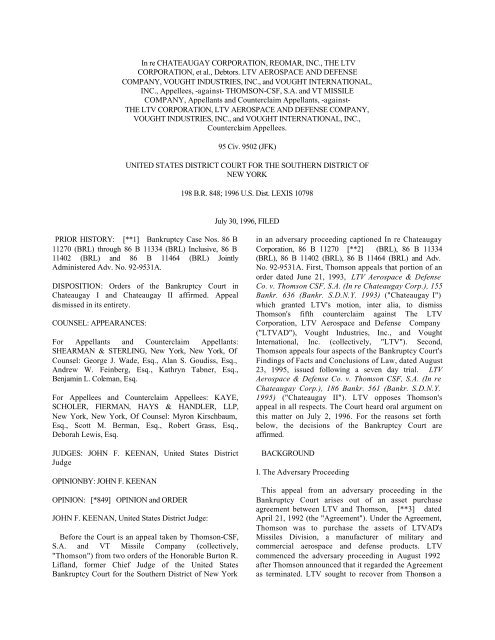
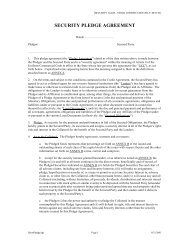
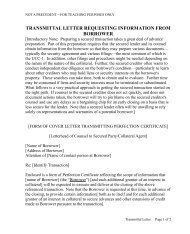
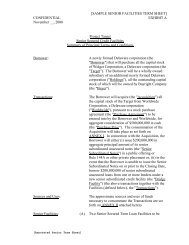
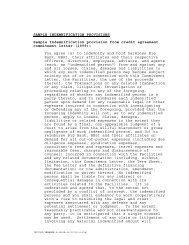
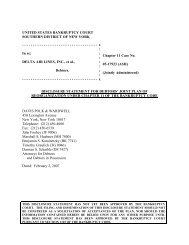
![[SAMPLE COMMITMENT LETTER] [Letterhead of] THE BIG ... - uccstuff](https://img.yumpu.com/42648066/1/190x245/sample-commitment-letter-letterhead-of-the-big-uccstuff.jpg?quality=85)
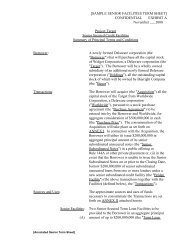
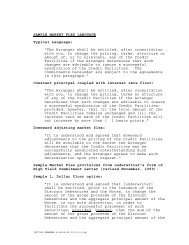
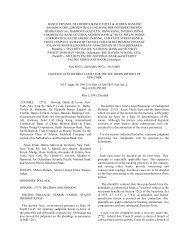
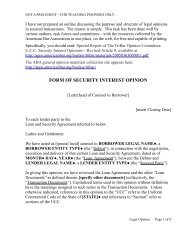
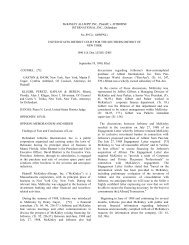
![[SAMPLE TERM SHEET] CONFIDENTIAL EXHIBIT A May ... - uccstuff](https://img.yumpu.com/29241258/1/190x245/sample-term-sheet-confidential-exhibit-a-may-uccstuff.jpg?quality=85)
